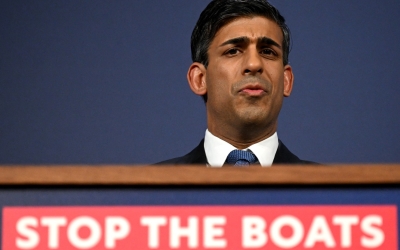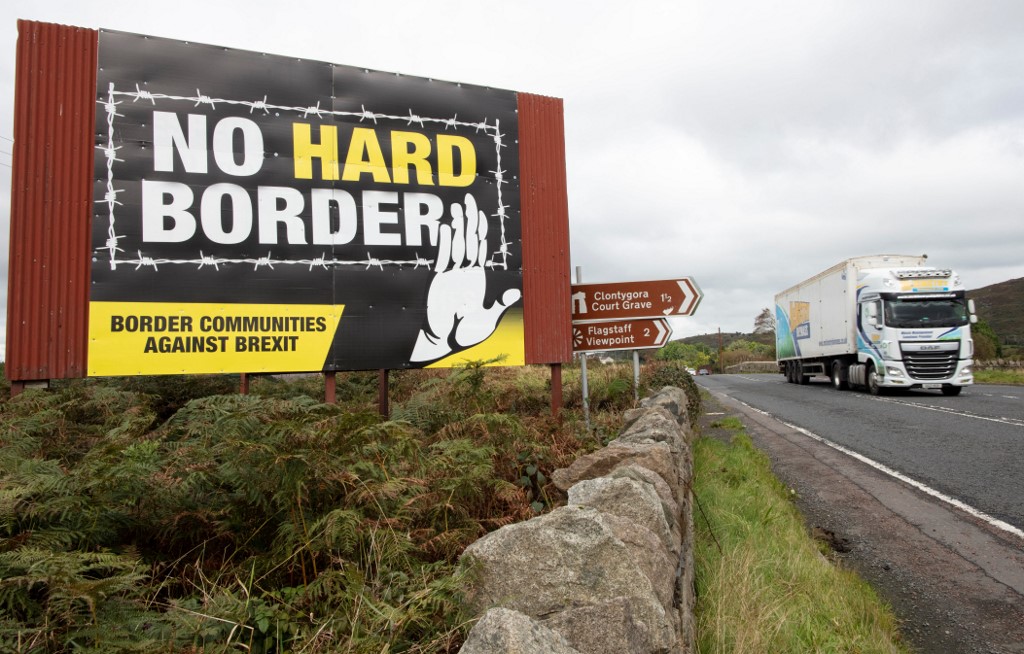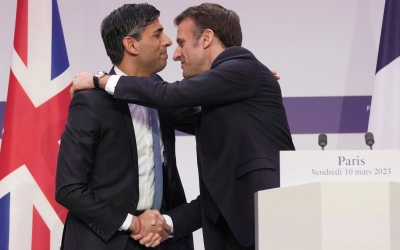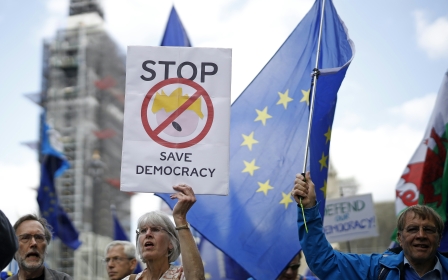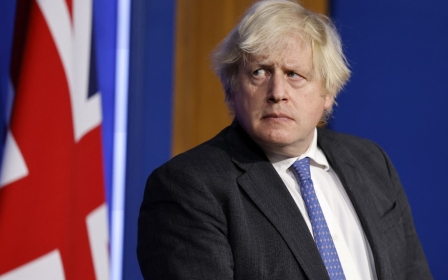The Brexit arsonists now posing as firefighters

In the past few weeks, British Prime Minister Rishi Sunak has made much of two new policies to boost his government’s flagging popularity.
The first was an agreement with the EU to improve the trade rules in Northern Ireland that have hampered the province since Brexit. The second was a new migration bill aimed at reducing the small boats ferrying migrants and refugees to the UK by declaring them illegal.
Sunak pitched himself to the British public, and his own party, in different ways for each policy. On Northern Ireland, he was a pragmatist, keen to improve ties with the EU after years of post-Brexit tensions, not least over Northern Ireland.
On the migrant boats, in contrast, he took on the mantle of hardliner, appealing to a perceived bloc of anti-immigration voters.
Yet, whatever electoral strategy Sunak is pursuing, both are solutions to the same problem: the Brexit deal agreed by his predecessor (but one), Boris Johnson. The irony, of course, is that the firefighter trying to fix the problems was one of the original arsonists, who cheered Johnson’s flawed deal as his chancellor.
Northern Ireland trade has been stymied ever since Britain left the EU. The "Northern Ireland protocol" that Johnson agreed as part of his deal saw Northern Ireland remain effectively inside the EU’s single market and customs union to prevent the return of a hard border between itself and the Republic of Ireland.
The result has been a customs border between the province and the rest of the UK, delaying trade and separating the region from mainland Britain’s markets, angering both Northern Ireland’s Unionists and its businesses.
Sunak’s new agreement, the "Windsor framework", aims to mitigate some of this by allowing goods heading to Northern Ireland only to pass from Great Britain without needing customs checks, reserving these only for cargo headed on to the Republic.
Boats crisis caused by Brexit
The migrant boat crisis was also a product of Johnson’s deal. A recent report by Durham University found that there were no recorded boat crossings before 2018, and numbers were steady until Brexit went through in 2020.
Since then, they have exploded, with 45,000 making the crossing in 2022, and nearly double that forecast for 2023. The report lays the blame for this squarely on Johnson’s deal that pulled Britain out of the Dublin Convention, which allowed London to ask other EU countries to take people back if they had entered the UK via safe countries.
No replacement was agreed upon by Johnson, incentivising people-smugglers, and desperate asylum seekers, to head to Britain, knowing they would now not be returned.
Experts repeatedly warned the government of the problems with Johnson’s deal, specifically on Northern Ireland and migration
Sunak’s solution, in contrast to his pragmatism on Northern Ireland, is more draconian. He proposes to criminalise, detain and deport refugees with the goal of deterring those from making the crossing, despite opposition claims this could break international law.
Taking a step back, London’s approach seems farcical. Sunak is offering solutions to problems that he helped create as Johnson’s chancellor and supporter of the deal.
Experts repeatedly warned the government of the problems with Johnson’s deal, specifically on Northern Ireland and migration, but they were dismissed as "fear-mongers" and "doomsters". Not that Sunak is willing to offer anything approaching humility or a mea culpa. His triumphalism on both policies ignores the problematic side of Brexit, as if these were issues that magically appeared.
Moreover, no one seems keen to point out that Sunak’s solutions still leave Northern Irish trade and irregular migration in a worse position than it was prior to the implementation of Johnson’s deal. Sunak has climbed halfway out of the pit he and Johnson dug, but he is still in the hole.
Policy choices
This, though, is the reality of Tory Brexitism. On almost all metrics, Britain is worse off than it was before leaving the EU. The NHS is in a worse position, not receiving the £350m a week Leavers promised would be diverted from the EU, while its loss of European workers has left it short-staffed and struggling.
Trade between the UK and EU has fallen by 20 percent, with customs paperwork obstructing the "frictionless trade" Johnson and others promised, contributing to the UK having the lowest growth in the G7.
Yet the successive governments of Johnson, Truss and now Sunak have refused to face this reality. They prefer to deny the negative impact of their policies, while celebrating minor "achievements" - whether trade deals or Sunak’s new agreements on Northern Ireland and migrants - which leave the UK worse off or, at best, in the same position as it was when in the EU.
Of course, it is also rarely mentioned these days that this was not the only Brexit available. When a narrow majority of British voters decided to leave the EU in a 2016 referendum, it was not specified what that Brexit would look like.
The "hard" Brexit we now have, which has seen the UK not only leave the EU but also its single market, customs union and a raft of shared laws and agreements, was the result of policy choices by the Conservative governments of Theresa May and Johnson.
Labour Brexitism
Neither the Northern Ireland trade issues, the migrant boats, nor the many other limitations to British trade and labour supply would have been as problematic had a "softer" Brexit been pursued.
Unfortunately, highlighting such evidence is increasingly unpopular in British policy circles, on both sides of the aisle.
Indeed, Keir Starmer’s Labour Party seems determined to move on from the toxic Brexit debates of the past half-decade by proposing improvements to Johnson’s deal rather than moving towards the closer relationship with the EU that a softer Brexit might have produced.
For example, Starmer has ruled out re-joining either the single market or the customs union if he wins the next election, as seems likely.
A Labour government will instead probably replicate much of Sunak’s current approach: offering creative "solutions" to the problems of Brexit.
Such Labour Brexitism may be more practical and less hardline than the Tory Brexitism of May, Johnson, Truss and Sunak, but it will still leave Britain worse off than it was before Johnson’s deal.
The views expressed in this article belong to the author and do not necessarily reflect the editorial policy of Middle East Eye.
Middle East Eye delivers independent and unrivalled coverage and analysis of the Middle East, North Africa and beyond. To learn more about republishing this content and the associated fees, please fill out this form. More about MEE can be found here.



